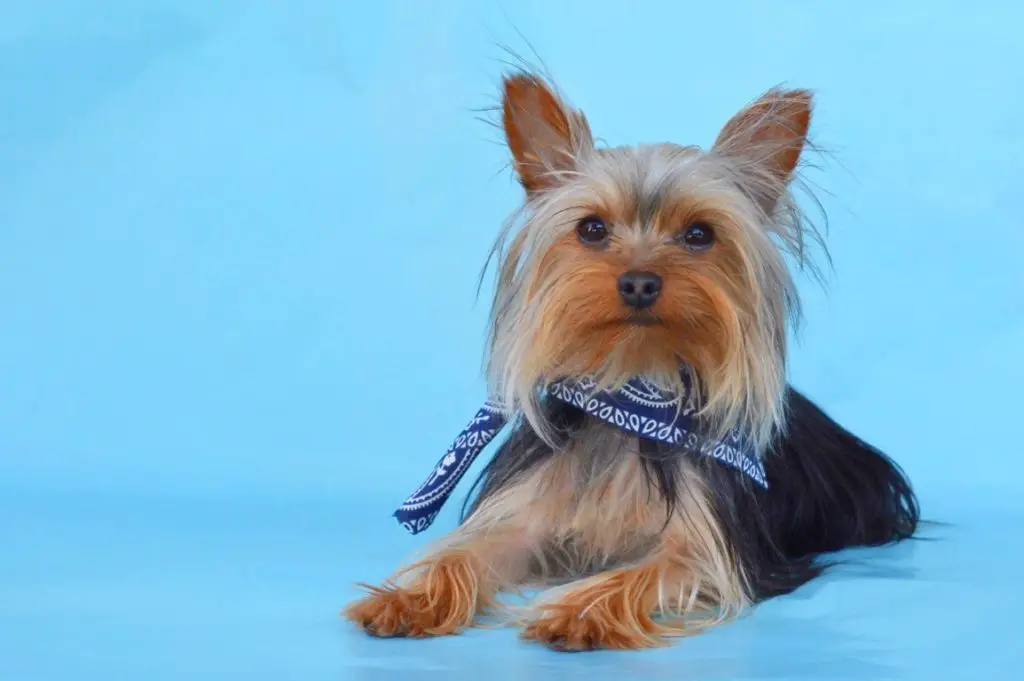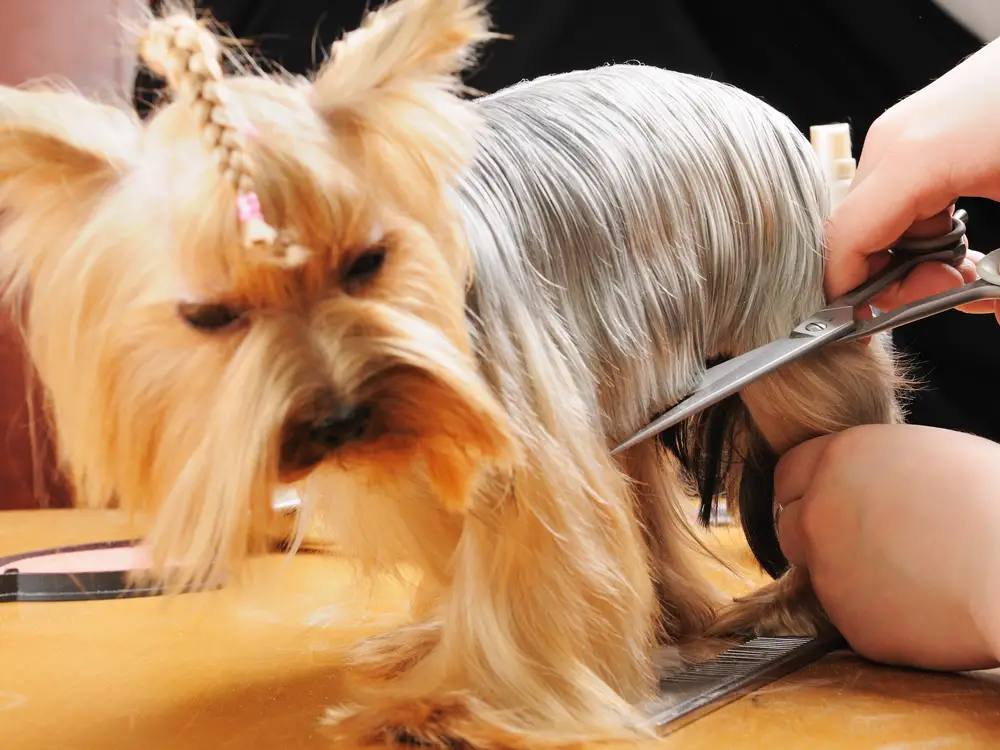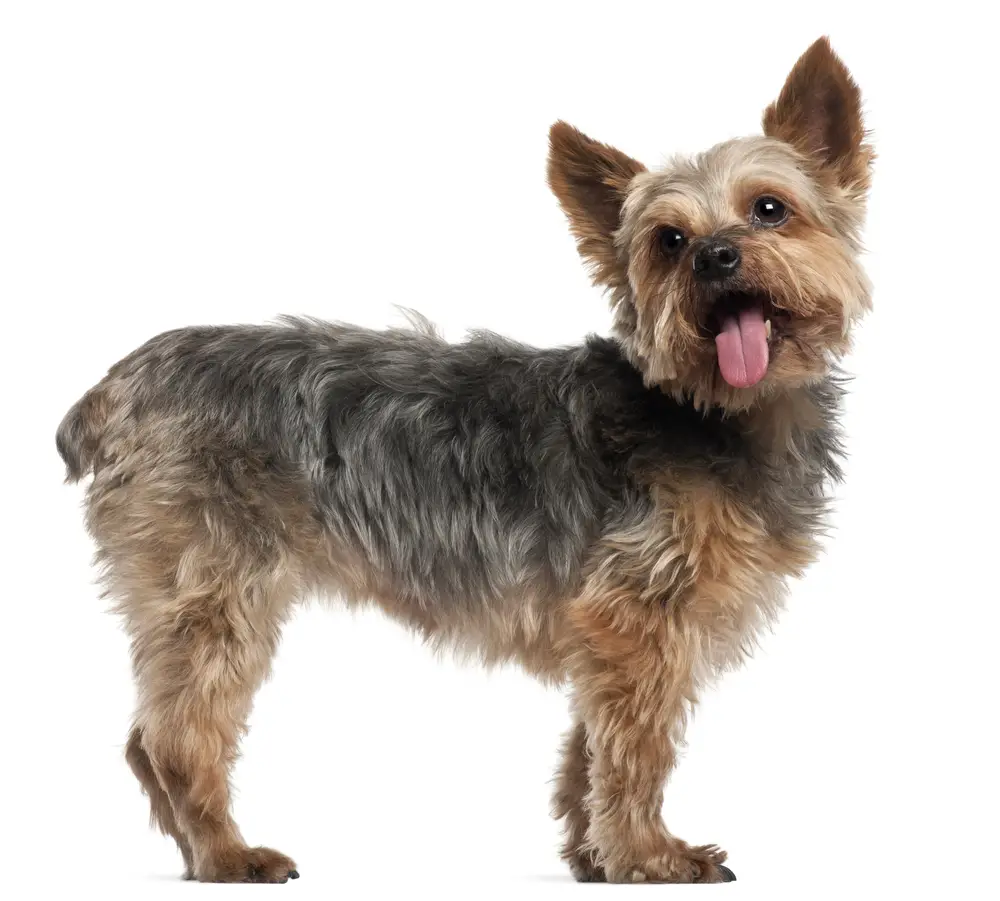Why is my Yorkie Acting Strange?
Why is my Yorkie Acting Strange?
 Is your Yorkie barking at nighting? Suddenly acting frightening? Shaking uncontrollably? There are many potential reasons for your Yorkie’s strange behavior. Yorkies are known for their quirky personalities but there’s usually a good reason when they suddenly exhibit unusual behavior you’ve never seen before. Ahead, we’ll delve into common strange Yorkie behaviors and hopefully get to the bottom of just what is going on with your pup.
Is your Yorkie barking at nighting? Suddenly acting frightening? Shaking uncontrollably? There are many potential reasons for your Yorkie’s strange behavior. Yorkies are known for their quirky personalities but there’s usually a good reason when they suddenly exhibit unusual behavior you’ve never seen before. Ahead, we’ll delve into common strange Yorkie behaviors and hopefully get to the bottom of just what is going on with your pup.
My Yorkie Is Acting Drunk
If your Yorkie is staggering, falling down or acting tipsy, don’t laugh it off as funny behavior. You know they didn’t get into the liquor cabinet so tipsy behavior should be taken seriously.
Liver Shunt
Some Yorkies may be born with this potentially fatal congenital condition. With a liver shunt, the blood circulating the body completely bypasses the liver. This causes toxins in the blood to never get cleaned out of the body. You may start to see digestive system issues, poor weight gain, listlessness, uncoordinated movements, urinary system troubles such as excess thirst and urination, and seizures appearing shortly after eating.
Stroke
When a dog (or human) is having a stroke, the consistent flow of blood that the brain requires is reduced or shut off entirely. This will cause symptoms such as a loss of balance or blindness. In other words, your Yorkie will give the appearance of acting drunk. Strokes typically affect middle-aged to elderly dogs, but this isn’t to say that younger dogs can’t experience a stroke. You can learn more about recognizing a stroke in your dog from the American Animal Hospital Association.
The severity of symptoms will be contingent upon which region of the brain suffered the reduced blood flow, and for how long the brain was deprived of blood and oxygen. The following symptoms are potential signs that your Yorkie may have suffered a stroke:
- Seizures
- Circling or weaving
- Head tilting
- A sudden collapse
- Vision loss
- An inability to recognize their owner
- A loss of bowel or bladder control
- Loss of balance or falling often
There are two different types of stroke: ischemic and hemorrhagic. Ischemic strokes occur when there has been a lack of blood flow to the brain, and is the most common type of stroke known to affect dogs. Hemorrhagic strokes occur when there is too much blood in the brain as a result of a broken blood vessel causing leaking between the brain and the skull.
Your Yorkshire Terrier may be at risk of a stroke if they have these risk factors:
- High blood pressure
- Cushing’s disease
- Congenital clogging disease
- Increased thickening of blood
- An infection in the central nervous system
- Thyroid gland abnormalities
- Head trauma
- Heart attack
- Intravascular cancers
- Heart, liver, or kidney disease
- Abnormal development of blood vessels
- Inflammation in arteries or blood vessels
- Ingestion of rodent poisoning
Poisoning
There are potential doggy hazards everywhere, and unless your Yorkie has never been in the outside world and your house is 100% puppy-proofed, they’ll likely sooner or later eat something they shouldn’t. Seemingly acting drunk, with or without dry heaving, vomiting, or other clinical signs, is a sign your Yorkie may have been poisoned.
The following are foods you should avoid giving a Yorkie.
Hypoglycemia
Most commonly applicable to Yorkie puppies, hypoglycemia can actually affect toy breeds at any age, especially if you have a Teacup Yorkie. Hypoglycemia transpires when a rapid drop in blood sugar levels occurs, and this can cause some very peculiar behavior. Sometimes simply rubbing some honey onto your Yorkie’s gums can be enough to fix a minor case of low blood sugar, but in moderate to severe cases, a visit to the vet will be required and an IV intervention may be needed. Hypoglycemia is potentially a very serious issue, as a coma or even death could be a possible outcome in severe instances.
If your Yorkie is diagnosed with hypoglycemia, you will need to follow careful feeding guidelines. Hypoglycemic Yorkies need to eat snacks between meals and benefit from a high-calorie puppy kibble supplement.
Head Injury
Since Yorkshire Terriers and other toy breeds are so tiny, even the smallest tumble to the ground can cause an injury to the head. All sorts of strange Yorkie behavior can really come as a result of a head injury. Side effects may include changes in behavior, uncontrolled shaking, a loss of coordination, and a funny tilting of the head. Even if you did not see your Yorkie fall, if you are seeing any of these symptoms, you should have him or her examined as soon as possible.
My Yorkie is Shaking and Hiding
Yorkies may shake and hide if they get scared. This may happen if there’s an unfamiliar visitor in the house, loud noises, or a new pet. There may be other reasons for a Yorkie that’s shaking and hiding that need attention.
Hypoglycemia
Hypoglycemia is especially common in Yorkshire Terriers, particularly Yorkie puppies and Teacup Yorkies. While it can be managed, it can be incredibly serious and even fatal. As a result of the low levels of blood sugar, you may see symptoms such as shaking, and they may want to be left alone for fear of being vulnerable.
Make sure your Yorkie is eating regularly with snacks between meals and a high-calorie nutritional dog supplement on their kibble.
Difficulty Regulating Body Temperature
Yorkies are tiny. That means they’re extra susceptible to hot and cold temperatures. On top of this, Yorkshire Terriers have no layer of fat to protect themselves and help to maintain body temperatures in the same way that other, larger dogs do.
Your Yorkie’s shaking and hiding may just mean that they’re very cold or even too hot. They may be trying to cool off or get warm somewhere in the house. If it’s even a little chilly, make sure your Yorkie is wearing a warm dog sweater.
My Yorkie is Acting Lethargic
 Much like us humans, canines are known for their fluctuations in behavior throughout the day. Even the friendliest of dogs can have a bad day, and even the most energetic dog can sometimes feel like just relaxing and having a lazy day. In some cases, an overly tired or moody-acting dog may have a more serious underlying health issue.
Much like us humans, canines are known for their fluctuations in behavior throughout the day. Even the friendliest of dogs can have a bad day, and even the most energetic dog can sometimes feel like just relaxing and having a lazy day. In some cases, an overly tired or moody-acting dog may have a more serious underlying health issue.
Lethargy is a top sign to look out for when spotting an illness. It can be caused by anything from tick bites, hypothyroidism, and diabetes to liver problems, heart issues, and anemia. Other possible reasons may include:
Dehydration
It’s still possible for dogs to get dehydrated when drinking water regularly. Dehydration is most likely to happen during the summer months, but it can still occur at any time of the year. A drop in water levels as small as 2 to 3% is enough to cause concentration issues and decreased awareness.
For Yorkies that require some encouragement with their drinking, a canine water fountain may work well. Also, ice cubes and other fruits with high water content can be of great help in the summer. Try making your Yorkie homemade fruit ice pops to enjoy.
Normal Aging
When it comes to the more senior Yorkies, much more rest and relaxation is required. This is obviously a gradual process, however, you may not quite notice this gradual increase in the need for sleep and rest as your Yorkie ages. Still, do not brush aside any excessive weakness or lack of energy in seniors. If you suspect their lethargy is extreme or they struggle to get up and walk, it’s time to see the vet.
Female heat cycle
With female Yorkies, the heat cycle brings with it drastic increases and decreases in their hormone levels that can cause moodiness. Some dogs may become more clingy, while others just want to be left alone to rest.
Disturbances in the night
While some dogs do alert their owners if they are awake in the night, some may not. If you suspect your Yorkie may be staying awake in the night, it could be a sign of an injury or an illness, so it might be worth having it checked out.
This could, however, simply be a case of a new noise waking him up, or something else in the outside world, such as car doors, chirping birds, or a passing train, for example. If disturbances at night are frightening your Yorkie and keeping him from sleeping, he may act lethargic during the day. You can try moving his sleeping area to see if it helps or even setting up a white noise machine if you can’t move his bed.
My Yorkie is Walking Weird
If your Yorkshire Terrier seems to have trouble walking, doesn’t want to put weight on one leg, or seems to be in pain, it’s important to take it seriously. Yorkies are prone to several conditions that can affect their joints and bones and make walking painful.
Legg – Perthes Disease
Legg – Perthes disease is a disease in which the femur bone, located on the hind leg, spontaneously deteriorates, resulting in the bone and joints becoming inflamed and the hip bone disintegrating. Symptoms of this include hip joint pain, wasting thigh muscles, and a gradual onset of lameness.
The exact cause for Legg – Perthes disease is relatively unknown for now, although some research points to blood supply issues to the head of the femur bone being the cause.
Yorkies get Legg – Perthes disease more than any other breed. The onset of the disease is usually around 6 months but it can show up earlier or as late as 13 months old.
Luxating Patella
A luxating patella, otherwise known as a trick knee or a floating kneecap, is an issue commonly found commonly in Yorkshire Terriers. In fact, Yorkies are the second most common breed to get this disorder and an astounding 1 in 4 Yorkies have it to some degree.
As the result of either an inherited trait or an injury, the luxating patella condition causes the kneecap to pop out of place. The symptoms of a luxating patella can vary widely, mainly contingent upon the severity of the condition. You may notice things such as strange walking patterns, a bow-legged stance, a skip in your Yorkie’s walk, or pain when you or someone else attempts to touch their hind legs.
There are four grades of luxating patella. At grade 1, the kneecap should be able to be moved out of position manually, but it will return to its normal position. With grade 2, the out-of-place kneecap will stay out of place until returned to its normal position manually. In grade 3, the patella will remain luxated most of the time, and when moved, it will return to its out of place position. With grade 4, the Yorkie’s patella will be constantly out of place, and any attempt to manually push it back into place will be impossible.
Hypoglycemia
As mentioned previously, Yorkies – especially Yorkie puppies – are very vulnerable to hypoglycemia and the effects of low blood sugar. Infrequent eating, stress, digestive tract illness, or strenuous activity can bring on episodes of hypoglycemia, During a hypoglycemic episode, you may see your Yorkie acting disoriented, staggering, or walking very slowly.
My Yorkie is Coughing
If your Yorkie is coughing, there’s one very important condition that should be on your radar.
Collapsed Trachea
The distinctive honking cough of a collapsed trachea indicates a chronic and progressive disease which causes the cartilage in the trachea to weaken and collapse. Thought to be a condition present from birth, other factors that could lead to tracheal collapse include obesity, respiratory infection, an abnormal enlargement of the heart, a buildup of fluid in the lungs (pulmonary edema) and allergic respiratory disease. Yorkies with a collapsed trachea will have difficulty breathing, even when resting, and feelings such as distress or excitement may exacerbate symptoms. Even exercise or just being out and about on a hot and humid day can make it dangerously difficult for your Yorkie to breathe.
One of the only risk factors for collapsed trachea that you can control is the use of a safe, soft dog harness instead of a collar. A collar puts pressure on the delicate trachea and may cause significant damage when your pup pulls against the leash.
My Yorkie is Acting Scared
 Most often, there is a pretty obvious reason why your Yorkie seems scared. On occasion, though, it can seem that your Yorkie has become scared for absolutely no reason, perhaps suddenly hiding in a closet, under a bed, or hesitating to enter certain rooms. Your Yorkie may even shake with fear.
Most often, there is a pretty obvious reason why your Yorkie seems scared. On occasion, though, it can seem that your Yorkie has become scared for absolutely no reason, perhaps suddenly hiding in a closet, under a bed, or hesitating to enter certain rooms. Your Yorkie may even shake with fear.
There may be something frightening your Yorkie that you can’t hear or see. Your Yorkie may even be hurt. Try ruling out any potential causes of your pup’s fear then taking him to the vet if it doesn’t improve.
My Yorkie is Acting Strange Following a Trip to the Groomer

Yorkshire terrier getting his hair cut at the groomer
Has your Yorkie’s odd behavior started after a trip to the groomer? There could be two reasons for this: either your Yorkie perceived an action to be disturbing or scary, or the task performed by the groomer caused some degree of distress. Perhaps the Yorkie even had some pretty severely matted hair that needed to be worked out, or maybe there was a new task performed that has not been done before.
Even if the groomer is great, highly competent, trusted, and professional, it’s no guarantee your Yorkie will get along with him or her and he may still come home frightened.
Yorkshire Terriers are incredibly observant and sensitive creatures. This can be a matter of gender in some cases, with a dog preferring a male or female handler, or in other cases the dog may simply just not like a certain person’s scent, or even their method of handling.
Sometimes a Yorkie may have been getting on great with the groomer until now. Perhaps the groomer passed some tasks to a new assistant, or perhaps had an overly busy day and didn’t quite have the time to give their usual level of attention.
There are a few options you may wish to take. Firstly, you may want to have a word with the groomer. If something new and unusual was done this time around, or if someone else did indeed take care of your Yorkie, you may be able to receive assurance that this can be avoided in future visits. If there was something unfamiliar done to your Yorkie, the groomer may be able to suggest potential steps that you can undertake at home to avoid its necessity upon the next visit. If there were large tangles removed, for example, your groomer may suggest brushing your Yorkie’s coat and practicing certain Yorkie grooming tasks at home. The groomer may also recommend using a leave-in conditioner to help avoid tangles in the future.
If your Yorkie is responding badly to your groomer, you should never be afraid to find a new one.
My Yorkie is Barking at Nothing
This is quite a common occurrence, however this makes it no less puzzling for owners trying to figure out what their Yorkie is barking at. Yorkshire Terriers can be very odd sometimes, often sitting in the middle of a room seemingly staring at nothing, barking at empty air, and becoming nervous and agitated. You may see them appearing to trace the path of something invisible from one room to another, or barking at the wall, the air, or even chasing something that doesn’t appear to exist. The answer to all of this can be pretty straight forward – they can hear and smell things that we can’t.
Bear in mind that canines can hear a wide gamut of sounds that are simply inaudible to the human ear, and not only can they hear to as much as 4 times the distance as we can, they can also hear on a vastly superior frequency range. Where the human ear picks up 64 to 23,000 Hz, dogs can hear at a range of 67 to 45,000 Hz. Where our ears have 6 muscles that control the movement of our ears and their ability to hone in on a noise, dogs have 18.
The canine sense of smell is even more amazing and a source of many studies. Their sense of smell is tens of thousands times superior to ours as they can smell things that are as deep as 40 feet underground, or easily pick out smells that are over a mile away.
With all this in mind, it’s easy to imagine that at all times your Yorkie can hear and smell things that our human senses would find impossible to detect.
When looking and barking at something that appears to not be there, your Yorkie will most often be looking in the direction of something that he is picking up on. Maybe this is something far, far away like a house alarm or a siren, maybe it’s the scent of another animal, or it might be another dog barking so far away that you can’t hear it. Your Yorkie may also be barking at something on the roof like a squirrel or a bird, or even something that’s on the other side of the wall. Should there be a mouse living within the walls, you can be certain that your Yorkie will most certainly pick up on it, and respond to it in any and every way it sees fit. Usually with a lot of barking.
Typically, when not sure if he is correct to be alert and alarmed, a dog will look to his owner for confirmation. Of course, the dog has no awareness that their owner may not be able to hear or smell what they’ve been noticing. Many owners make the mistake of becoming alarmed themselves with their dog which confirms to the dog that something deserves barking. The best course of action you can take as an owner is to stay calm and relaxed during these episodes. Hopefully, over a short period of time, your Yorkie should come to realize that they had no reason to be alarmed.
If you see this kind of behavior continuing, or even worsening, it may be worth investigating if there are any stowaways living somewhere in your house, such as a family of squirrels making a new home for themselves in the attic.
Also, keep in mind that odd staring and a repeated pattern of barking, almost as if the dog is stuck on a loop or sounding like a skipped record, can be a symptom of certain types of strokes. So if you do find the behavior to be alarming, record these occurrences and show them to your vet.
My Yorkie is Acting Agitated and Hyper
Most Yorkshire Terriers are even-tempered and adaptable. When a Yorkie suddenly becomes agitated, it can be surprising. This can happen for a few reasons
Genuine Agitation
Even the most friendly, easy-going, and adaptable human being has their limits, and dogs are no different. Try assessing the environment to see if there’s anything different from the norm. Perhaps schools are out for summer and there’s active, excited children around everywhere all day long. Maybe your Yorkie’s special area of the house has been moved and he feels he has no personal quiet spot to retreat to. If it is possible to rectify any changes that have been made that could potentially be the cause of your Yorkie’s agitation, try to do so.
Increasing intolerance
Most relevant with older dogs that no longer seem fine with people, tasks, noises and events, and situations that were ok previously, issues such as vision and hearing loss may cause dogs to start having trouble in certain environments. Allowing your Yorkie to make their own decisions about whether they want to engage, wait and see, or retreat can help resolve any issues most of the time.
Pent up energy
In many cases of strange behavior, including pacing, excessive barking, and hyperactivity, your Yorkie simply has too much energy and needs an outlet. Try taking your Yorkie on more frequent walks and engage in fun play time to relieve the boredom that can make him act out.
If you find that your Yorkie’s energy is being released in a negative, or even destructive fashion, this is a sure fire signal that you need to add another walk to the walkies schedule, or perhaps instead to increase the walk by an extra 10 or so minutes.
Health Issues
As you would expect, when a dog is feeling under the weather, there will be some degree of a change in behavior and personality. This could manifest itself in one or more of a vast range of ways, such as acting scared, nervous, clingy or tired, for example, and in some cases, if your Yorkie is feeling vulnerable as a result of their illness or injury, then you may see him or her responding with some degree of agitation.

